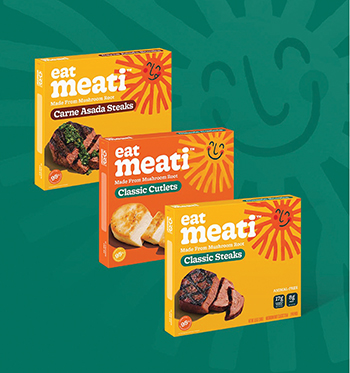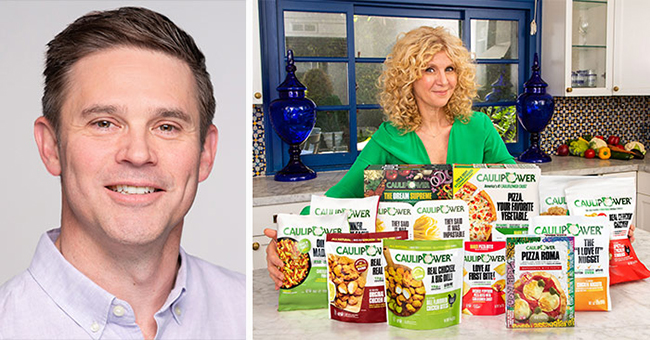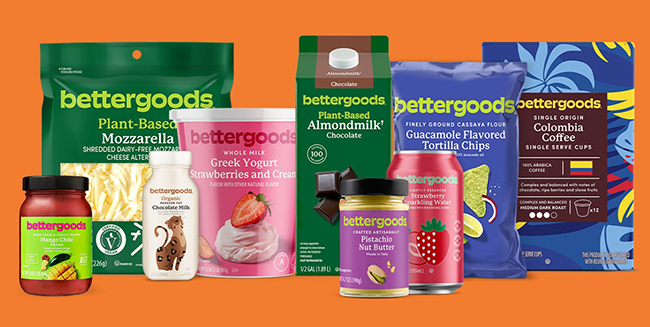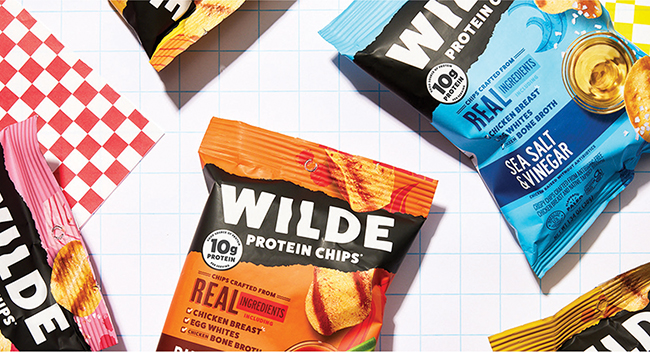NOSHscape: The Latest Food Brand News
Meati Raises $100M, Locks In Kroger Deal As ‘Path to Profitability’ Accelerates
Meati announced a trio of big moves in May, headlined by the closing of a $100 million investment led by Grosvenor Food & AgTech along with existing investors Prelude Ventures, BOND, Revolution Growth and Congruent.
The news is accompanied by a new distribution agreement that will bring three of Meati’s mycelium-based alt-meat products to 2,000 Kroger doors nationwide. Additionally, the company shared that co-founder and chief innovation officer Tyler Huggins has moved into an advisory role, passing day-to-day duties off to recently appointed CEO Phil Graves.
“When Justin Whiteley and I founded Meati, we set out to harness the power of nature to make awesome products that were a positive force for good in the world,” said Huggins. “It’s inspiring to see how far we’ve come in a short period of time, and I’m ready to pass the day-to-day running of the company to Phil Graves and the leadership team to take it to the next level.”
As for that next level, Graves said Meati will use the new capital to maintain its “high growth momentum” and continue scaling in U.S. retail. The new agreement with Kroger will expand access for its Classic cutlet as well as its Classic and Carne Asada steaks to both Kroger flagship and banner stores including Ralphs, Mariano’s, City Market, King Soopers, Dillons and others.
Those gains bring Meati to 6,000 stores nationwide in just over a year since its retail launch. The Boulder-based company also sells a Crispy Cutlet product, and its offerings are available at Super Target, Whole Foods Market, Sprouts Farmers Market, Meijer and Wegmans. Meati claims that nearly 40% of its customers have chosen its products as their first plant-based meat alternative purchase and said it sees a repeat purchase rate of “as high as 60%.”
In addition to continuing to grow the business, Graves said Meati will also use the new funds to keep building awareness for its MushroomRoot ingredient, primarily working to share how it’s differentiated from other plant-based meats available on the market. The company has a stacked roster of celebrity investors it could also tap in support of those efforts, including former Olympian Aly Raisman and NBA All-Star Chris Paul, who joined in December.
“Compared to a traditional steak, creating MushroomRoot uses 89% less water and has an 88% lower carbon footprint,” Graves said. “From a health perspective, Meati is a front runner in the alternative protein space – we’re a super food, a whole food protein free from saturated fats and cholesterol that provides significant daily fiber and nutrients.”
Meati has also garnered support from MLB Hall of Famer Derek Jeter, chef and restaurateur Tom Colicchio, TV personality Rachael Ray, and Sweetgreen co-founders Nicolas Jammet and Jonathan Neman.
But those gains haven’t come without compromise. While the company has raised upwards of $365 million in the seven years since it was founded, it has also conducted three rounds of layoffs in the past twelve months alone.
Meati last raised $50 million in September and subsequently laid off 10% of its employees, telling Nosh at the time the funds would be used as an “economic cushion.” Graves elaborated that the funds were primarily used to finish construction on its Colorado-based “Mega Ranch” production facility. The company also closed its pilot manufacturing plant during that time.
In February, Meati hired Graves as the company’s CFO, and just two weeks later, he was promoted to CEO. That change was made so that Graves could help “right size” the company, a spokesperson told Nosh at that time, which included laying off 13% of its workforce as it made another push towards profitability. According to Graves, those efforts are now showing returns.
“The actions we’ve taken have reduced our burn rate by 40% and have significantly accelerated our path to profitability,” he said. “Specific measures include streamlining our operations, eliminating unnecessary ingredients, reducing waste and moving away from temp labor.”
Graves said he anticipates no further changes to the team following this latest capital raise. He believes the company is in the right place to continue to grow and cited his time at Patagonia, where he helped establish and run the outdoor company’s corporate venture fund and analyzed over 3,000 companies that applied for funding.
“From my experience, I can confidently say there is no company more sustainable and scalable than Meati,” Graves emphasized. “Our MushroomRoot can produce the equivalent of hundreds of cows’ protein in just a few days from only a tablespoon of spores… Meati is truly unique and is poised to change the alternative protein industry.”
Tyler Ricks Named CEO at Caulipower
More on Tyler Ricks joining Caulipower as CEO: He has been a member of Caulipower’s board of directors since 2022, and replaces departing CEO Marc Seguin, who helmed the company over the past two years, succeeding founder Gail Becker in the role.
Ricks’ appointment comes as Caulipower is entering a new growth phase. The frozen food company, which generated $120 million in retail sales over the past year, recently expanded its portfolio of gluten-free pizzas, chicken tenders and bites, pastas, meals and more, sold at 25,000 stores nationwide.
“I’m not a disruptive founder; I’m the guy who can figure out how to really partner with the disruptive founder and help unlock their potential to really continue to impact the business,” Ricks said in an interview with Nosh.
Ricks has invested in more than 40 businesses and sits on more than a dozen boards. He previously held leadership positions at Peet’s Coffee and Bear Naked Granola, among other brands, and joined Super Coffee as an investor and board member in 2018. He became president of the beverage brand in March 2022 and was elevated to CEO later that year.
During his tenure, he brought the business – what he described as “a high-growth, highly unprofitable company” – to solid financial footing. He remains an investor and advisor to the company.
“My biggest concern was making sure that we could get Super Coffee to the place it needed to be to make this transition,” Ricks told Nosh, adding, “I wouldn’t have been able to say that six months ago, where I would have felt comfortable walking away.”
Becker added, “I’ve actually had my eye on Tyler for quite some time. If there’s one thing I’ve learned, timing is everything in business.”
In October, Caulipower unveiled nine new items, including frozen pinsa-style pizzas and baked pizza bites featuring a cauliflower crust, marking its largest-ever “innovation announcement.” Ricks intends to draw on decades of brand management and operational experience to support these launches while providing a “fresh lens” to new product development opportunities.
“It’s really about finding those best practices, those systems, those tools, those frameworks, those processes … just enough of that stuff to help keep the wheels on the bus when you accelerate growth,” he said.
Seguin, who previously held sales and marketing leadership roles at GT’s Living Foods, popchips and Paramount Farms, will step down following a transitional period. Becker said she plans to remain involved in all aspects of the business, partnering with Ricks and the team on innovation, brand, consumer touchpoints and sales to drive continued growth of her eight-year old company.
“I’m really proud that I created and built the company to over $100 million,” she said. “I don’t have anything left to prove.”
Walmart Doubles Down On Private Label With Premium, Accessible bettergoods Debut
The country’s largest grocery retailer is setting up to capitalize on consumers’ growing affinity for private label offerings amid continued, heightened food prices.
Walmart debuted its new store brand, bettergoods, in April with over 300 unique products spanning frozen, dairy, snacks, beverages, pasta, soups, coffee, chocolate and more. The mass retailer claims this is its largest private label food brand launch in nearly two decades and the fastest it has brought a new brand to market.
“Today’s customers expect more from the private brands they purchase – they want affordable, quality products to elevate their overall food experience,” said Scott Morris, SVP of private brands, food and consumables at Walmart, in a press release. “Bettergoods is more than just a new private brand. It’s a commitment to our customers that they can enjoy unique culinary flavors at the incredible value Walmart delivers.”
While store brands are historically better value alternatives to brand name products, Walmart is aiming to align lower prices with demand for the premium, upscale items. According to Walmart, bettergoods will sit on-shelf for between $2 to $15; the vast majority of offerings will be available for around $5.
Additionally, Walmart claims that unlike most private offerings, which are often modeled after popular name brand foods, many bettergoods items are unique to Walmart and created by its in-house product development team, in collaboration with global suppliers. Bettergoods products are housed under three broad categories – Culinary Experiences, Plant-based and “Made Without” – and include everything from hot honey seasoning to a four ingredient, Sweet Cream Dairy Creamer.
According to Kelly Criswell, founder and principal of strategic creative and brand design agency Mudge, the overall look for this expansive range does “a fine job at feeling like a modern private label brand.” She said her initial reaction was that “Walmart made a more approachable version of Target’s Good & Gather.”
The line has also drawn similarities to Trader Joe’s “dupe culture” approach to private label products due to the flavor variety, like frozen chicken wings with a Brown Sugar BBQ dry rub. On the product-specific design front, she noted that the culinary experience items could have been made more distinct with less generic food photography, stating the “designs are expected, and not differentiated.”
“It’s a real challenge when designing a system for a portfolio so big across so many different categories,” Criswell said. “Their choice of using color to delineate categories (plant based, etc) is a good one, but… it may be harder for the consumer to quickly differentiate flavor from SKU to SKU… It’s such a broad design system that they likely made some concessions and sacrificed the shopability of some categories for consistency across the lines.”
Either way, the unified product range, and speed to which it was brought to market, signals that Walmart sees a significant opportunity to grow with a broad ranging private label food platform while competing with Target’s Good & Gather brand, among others.
Earlier in April during a webinar with Jefferies analysts, Jeff Wojtkowiak, president of In The Loop Consulting and a former Kroger executive, explained that private label business will likely be key revenue growth drivers for retailers moving forward.
Not only that, he emphasized that these offerings will serve as an opportunity to bring more consumers into stores, specifically for mass retailers like Walmart and Target, while highlighting that the differentiated private label approaches from discounters like Trader Joe’s and Aldi will serve as a guide.
Wilde Protein Chips Pumps Up With Muscular Investment
Wilde Brands has landed an eight-figure investment from previous backers and new investors who see a future for the protein snack brand to expand further in retail as it eyes international markets
The chicken chip maker announced in April it had secured over $20 million in a round led by existing investors KarpReilly and Bill Moses that also included new investments from the Family Fund and performing artists Jack Harlow and Machine Gun Kelly.
Harlow and Kelly were brought into the round by venture studio Grey Space Group, which — along with making investments in brands like Wilde and Koia — bridges the gap between CPG brands and cultural entities like athletes and celebrities.
Wilde has taken a long and winding road to getting to where it’s at now.
Initially, Wilde Brands started by making meat snack bars but began its pivot into a crunchier protein delivery format in 2017 when it launched its chicken chips. Eventually discontinuing the bars and going through multiple packaging refreshes, founder and CEO Jason Wright finally landed on Wilde’s current branding and recipe made from chicken breast meat, egg whites and bone broth.
“I like the fact that we’re offering protein chips with real food,” Wright told Nosh. “Wilde gives the customer something totally different. We’re giving you a culinary experience and a flavor profile that you’re not gonna get with a powdered [protein] product.”
The brand has seven flavors (Nashville Hot, Chicken & Waffles, Buffalo, Barbeque, Salt & Vinegar, Himalayan Pink Salt and, its latest addition, Spicy Queso that all lean into the flavor profile of its hero ingredient while leaving plenty of room for new innovation.
Wright hinted that the brand is toying with Chamoy and Jalapeño Ranch varieties as well as another flavor launch in the works linked to a partnership with “the Holy Grail of chicken.”
Although consumer-friendly flavors might be driving adoption, growth is coming from the brand’s ability to reach shoppers in multiple channels and even in multiple store parts.
In the last year, sales picked up when Wilde expanded its distribution from natural channel stores like Whole Foods and Sprouts into mass and club partnerships with Target, Walmart and Costco. At Target, Wilde has placements in two categories: The four-packs of 1.34 oz. bags are in the Sports Nutrition set and are expanding into all 1,600 Target stores while its 2.25 oz. bags are in about 500 locations in the Alternative Snacking grocery category.
The brand is gearing up for a summer program in Costco that begins in June and will expand its footprint in the club chain’s warehouses. In total, WIlde is in about 20,000 doors including conventional retailers like Publix as well as online platforms like Gopuff and Amazon.
In an effort to “become a household name,” Wright said, the brand has also partnered with fitness events like Tough Mudder to build brand awareness.
Yet, the U.S. might not be the only place to run wild.
After recently returning from a trip to Germany to talk to equipment providers, Wright made a stop in Dubai to talk with a venture group about potentially bringing Wilde abroad. Along with Europe and the Middle East, the brand is looking north with ongoing conversations with Canadian retailers as well.
Though the plans are in their “very early stages,” Wright said that it has been a goal from the beginning “to prove that Wilde can be successful in another country.”
“Everything that you see here is happening there,” he said, referencing his time in Germany and Dubai. “People really want snacks that work for them, and protein is something that is filling and full of energy. All around it’s a better source than just 100% carbs.”
With some added capital, Wilde is well-positioned to dig deeper into that trend. The brand operates its own manufacturing plant in Lexington, Kentucky, and feels like it has the scale to expand both domestically as well as abroad.
For now, Wilde is focused on going deeper with its current retail partners but is watching how it can further differentiate itself from the other high-protein chips that are starting to fill out the snack set.
Competition is building with brands like ZeroCarb Lyfe bringing its own chicken-based protein chips to market last year. Quest Nutrition and Legendary Foods also have protein chips (both using milk protein isolate).
Although Wilde sees its use of animal protein as a differentiator in taste and texture from protein powder-based brands, Wright said more competition is not necessarily a bad thing when building a high-protein set out of the salty snack category.
“If you look at salty snacks right now it’s dominated by carbohydrates,” Wright said. “And I think: how many barbecue potato chips do you need?”


Receive your free magazine!
Join thousands of other food and beverage professionals who utilize BevNET Magazine to stay up-to-date on current trends and news within the food and beverage world.
Receive your free copy of the magazine 6x per year in digital or print and utilize insights on consumer behavior, brand growth, category volume, and trend forecasting.
Subscribe


